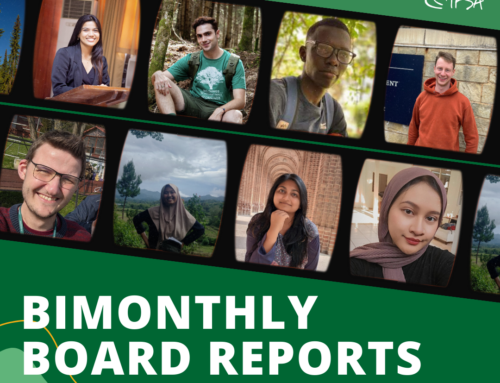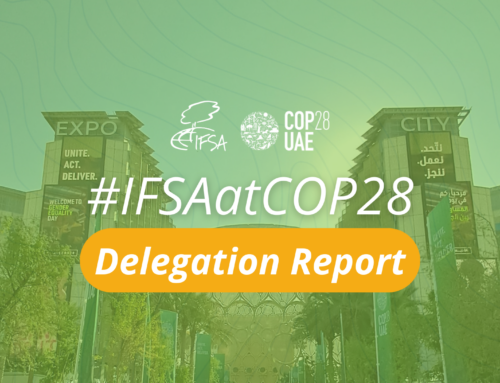Being an observer at the Intergovernmental Plenary session on Biodiversity and Ecosystem Services (IPBES7) was an awesome experience. It was a great privilege to learn and meet a network of equally passionate scholars, researchers and environmental enthusiasts. In addition, this experience was the closest I have been to a science and policy interface. It was quite intriguing to observe how delegates from various countries represent their nations in the process of making global decisions. I found it amazing that delegates of member states argued about simple words like “can” or “may” in an entire paragraph. I knew this was serious business when the American and Bolivian delegates had to contact their secretariat to accept or reject a statement in the global assessment report. Overall, a unique experience projected theory into reality for me.
Probably due to my African origin, I found myself particularly probing issues that concerned the African continent. I guess I was compelled to do this after observing the obvious absence of some African delegates from the decision-making table. To confirm my perception, I attended the African Regional Delegates Forum. Here, I realized how Africa consistently comes short of accessing opportunities that could transform the continent. There were available positions to select a bureau of experts that could champion the needed change on the continent. Unfortunately, Africa could scarcely produce experts that could help in this regard. The CVs were not strong enough, and for some who dared apply, they lacked competent or qualified profiles when compared with their foreign counterparts. This got me thinking what the challenge was, leaving unanswered questions about the possibility of Solutions to African challenges, coming from the continent.
On a more positive note, a blessing to see how various continents and their respective countries put aside their cultural and political borders to negotiate and dialogue the key decisions affects the future of the globe. These meetings were not fun; I realized this from watching scientists and policy makers sit for long hours, going through the nitty gritty of policies or reports. This was done tactfully, knowing that as delegates, whatever they consent to is strong enough to influence the lives of so many people. Especially those who have entrusted them with the authority and responsibility of representing their best interests.
This occurred to me that there is more to the idea of being a delegate or an ambassador for a course or a group. It is beyond being lodged in beautiful hotels and dining with dignitaries. This is a devotion to duty, enhanced when there is genuine interest and commitment to a course. It is a responsibility to both the present and future. A delegate is powerful enough to use the privileged voice and platform to either make a mark or not. It is a pressure-filled position. Little wonder, delegates wanted to express and defend their nation’s interest on a single statement. At this point, I realized that it is not being selfish. Rather, it is the reality birthed by the pressure to deliver, to represent and to serve. This got me thinking, what I will do if given the privileged position of being a nation’s delegate or ambassador.
One must applaud the remarkable strides achieved by the IPBES7 assessment. The outstanding one for me is the African Regional Assessment. This is the first of its kind for the continent and it constitutes one of four Regional Assessments conducted under IPBES. It is a synthesis of the state of knowledge on biodiversity and nature’s contributions to people. Therefore, this assessment provided a meaningful dialogue among stakeholders involved in African development. In addition, this expounds the untold value that biodiversity contributes to the citizenry and ecosystem of the continent.
Furthermore, Africa has opportunities to realize the benefits of having and exploring such rich biodiversity. This is in addition to using it in a sustainable way to contribute to its economic and technological development. This assessment also exposes the decline and loss of biodiversity occurring which affects lives daily and hampers the sustainable social and economic development desired by African countries. With Africa as one of the most rapidly urbanizing continents, this assessment highlights the potential pressure that exists on the continent’s biodiversity and nature. This includes its contribution to its people, given the projected increase in population. In my own opinion, the impact of unregulated changes could be debilitating. The solution lies in adopting and implementing appropriate policies and strategies. Africa is extremely vulnerable to the impacts of climate change. I believe the unregulated conversion of forest, rangelands and other natural areas, such as wetlands, for fast-paced food production and urban development worsens the environmental security of the continent. Such conversions lead to habitat loss and fragmentation, degradation of water catchments, and soil erosion leading to loss of biodiversity and livelihoods.
From this assessment, I learnt that this is not a very hopeless situation because there are ideas and plans to strengthen African Transformation Frameworks. The alignment of Agenda 2063 goals, Sustainable Development Goals and Aichi Biodiversity Targets with the conservation of biodiversity and nature’s contributions to people that enhance human well-being in Africa. This facilitates the development of interventions that can achieve multiple positive outcomes.
Furthermore, besides applauding the African biodiversity assessment, this plenary session helped me appreciate two needs. First is the need for quality research. This is because if approved as a policy, scientific research has a great influence on the people and their future. The second need is policymakers who are passionate about making the right policies that could inform change within a country. From observing IPBES7, I discovered the essence or cruciality of a good science-policy interface. This is essential because there is an increasing need for policy makers to appreciate science in the decision-making process. Policy makers should also support quality scientific research because it a basis for making quality decisions.
I will never forget the quick but memorable tour around Paris. This tour exposed me to the giant steps Paris has been taking concerning environmental health and carbon sequestration through tree planting. In addition to this, I came across the rich history and artistic legends of Paris. The unique stories of this city are immortalized art works, culture, customs and traditions, which the people cherish.
This report will not be complete without expressing my gratitude to the International Forestry Student’ Association, UBC Chapter and MasterCard Foundation Scholarship Program, UBC Chapter for making this experience a reality for me. Thank you; I promise to keep representing these organizations well!
Tolulope Afolabi




